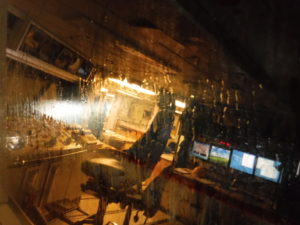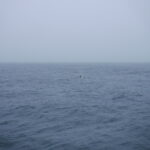A year and a half ago, in November 2018, I was able to volunteer on a research expedition across the Drake Passage from the Falkland Islands to Elephant Island off Antarctica. More than the waves or the long working days, the major challenge for me was the confinement. Often it was too stormy to even use the gym in the hold, let alone go out on deck. On these days the world shrank down to a handful of rooms and corridors. I would step straight out of my cabin and across to a steep flight of stairs. Down these stairs to the duty mess for an early lunch, back up the stairs to my cabin to clean my teeth and grab my notebook. Back out and along the corridor, turning to the right a first time to pass the officer’s mess, then right again to the control room at the end of the corridor.

Work in front of the computer screens here would take me through from noon until midnight. On a good day I would spend some time downstairs on the sampling deck. Then clocking off for the midnight meal back in the duty mess, up to my cabin and as many pages of my book as I could get through before sleep in my top bunk, the ceiling a foot above my head like the lid of a coffin.
All of which left me feeling more prepared than otherwise for social distancing and confinement to my Edinburgh tenement flat. Sure, we can get out for state-approved exercise and for provisions, but we are all experiencing a similar kind of world-shrinking to that which takes place working on a boat. For example, it’s only from these recent walks around my local neighbourhood that I know I live within a 10 minute radius of both a prime minister’s birthplace and a pet cemetery. Even within my small flat, I find myself converting a junk room into a rudimentary gym, and making the 8 or 9 steps from my bed to this room a crucial part of my morning routine.
I remember the feeling of being back on dry land in the Falklands, a sense of relief but also of wonder in experiencing the world a little differently to before crossing the Drake Passage. And after lockdown ends, for the first few days at least I hope, there are things we won’t take for granted as we did before Covid-19. Werner Herzog puts this feeling best in his Antarctica documentary Encounters at the End of the World:
“the best description of hunger is the description of bread”.


